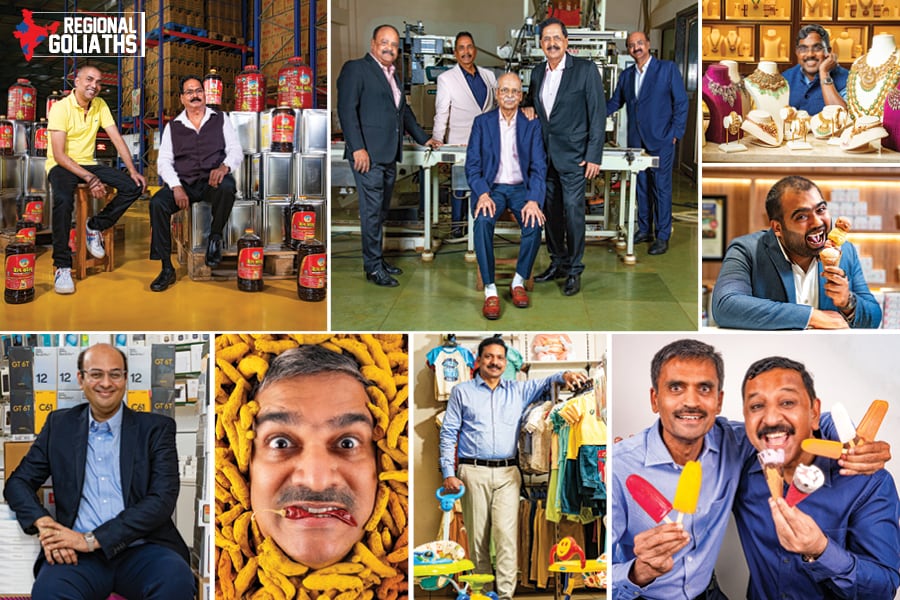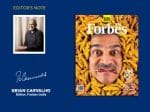When regional supremacy trumps national ambitions
A pack of regional brands is content with their thumping dominance in their respective categories. For them, being the 'biggest in a state' is as good as being the 'largest in the country'
 (Clockwise from left)Ghanshyam Khandelwal (right) and Ashish Khandelwal of BL Agro; the second generation of JK Masale Group (from left) Ashok Jain, Chandra Kumar Jain, Bhagchand Jain (seated), Jai Kumar Jain and Jitendra Jain; MP Ahammed of Malabar Group; Siddhant Kamath of Naturals Ice Cream; MN Jaganath (left) and A Balaraju of Dairy Day; Shaju Thomas of Popees; Sanjay Sharma of Orkla India and Siddharth Shah of SS Mobile
(Clockwise from left)Ghanshyam Khandelwal (right) and Ashish Khandelwal of BL Agro; the second generation of JK Masale Group (from left) Ashok Jain, Chandra Kumar Jain, Bhagchand Jain (seated), Jai Kumar Jain and Jitendra Jain; MP Ahammed of Malabar Group; Siddhant Kamath of Naturals Ice Cream; MN Jaganath (left) and A Balaraju of Dairy Day; Shaju Thomas of Popees; Sanjay Sharma of Orkla India and Siddharth Shah of SS Mobile
If happiness and beauty are states of mind, then self-perception too is a state of mind. Okay. Does this mean a cat can perceive itself as a tiger? Can David feel like a Goliath? Really? Well, it depends. When a cat pounces on a rat, it mimics the hunting skills of a tiger. Ditto for Davids. If a brand happens to be the biggest in a state or a region, and is bigger than the national brands—Ghari is bigger than Wheel, Nirma and Surf in Uttar Pradesh (UP); Star Cement is bigger than UltraTech, Ambuja and others in the Northeast; Balaji is bigger than Lay’s and Bingo in Gujarat, Wagh Bakri is bigger than Tata Tea in Gujarat—then it’s no longer a David. It’s a Goliath in that state.
Khandelwal is not alone in exhibiting such a state of mind. MN Jaganath too swears by the same ideology and mindset.
The biggest ice cream player in Karnataka, Dairy Day is among the top three brands in Tamil Nadu, closed FY24 with an operating revenue of ₹680 crore and a PAT (profit after tax) of ₹28 crore, and gets 68 percent of its revenue from Karnataka and Tamil Nadu.
Though it has expanded its footprint across Andhra Pradesh, Telangana, Kerala, Odisha and Maharashtra, it doesn’t aspire to become the biggest in India. “We want to be among the top four brands in India,” says Jaganath, managing director and CEO of Dairy Day. Though the aspiration is to expand the footprint, the entrepreneur is aware of the flip side of expanding at a furious pace. While conceding that every soft drink outlet is a selling opportunity for the brand, Jaganath underlines that there is room for multiple players. “It’s unrealistic to aspire to be the biggest player in all markets,” he says, adding that the ice cream business—like any other venture—needs a lot of common sense. “We are not reinventing the wheel. But we need to be smart enough to use the wheel in the best possible way,” he adds.
Also read: iD Fresh Food: Inside PC Musthafa's dosa-idli batter empire
If the ice cream believes in staying cool, then the custodian of the heritage brand MTR, too, is spicing up its play in a calibrated manner. “We don’t want to be a small fish in a big pond. We want to be a big fish in a small pond,” says Sanjay Sharma, CEO of Orkla India. Norwegian investment company Orkla bought MTR, the iconic food and spices brand, in 2007.
When Orkla completed the acquisition, MTR had an extensive footprint across India. Sharma pulled back the footprint. Reason? The market for processed food largely sits in the top 50 cities of India. “There was no point in taking our resources and spreading across 150 or 200 towns and cities,” he says. “Our primary job was to remain the cultural champions in the home state,” he adds.
In our annual issue of Regional Goliaths, Forbes India unfolds inspiring stories of a bunch of strong regional brands that have a stranglehold on their respective states, aka countries. Kolkata’s JK Masale, Mumbai’s Naturals Ice Cream, Kolhapur’s SS Mobile, Kochi’s Malabar Gold & Diamonds, and Malappuram’s Popees Baby Care are some of the Goliaths in their respective cities and states. While some want to have a wider play across India, most are content with their state of play. Well, big or small, David or Goliath, everything is a state of mind. Isn’t it?
(This story appears in the 09 August, 2024 issue of Forbes India. To visit our Archives, click here.)


















